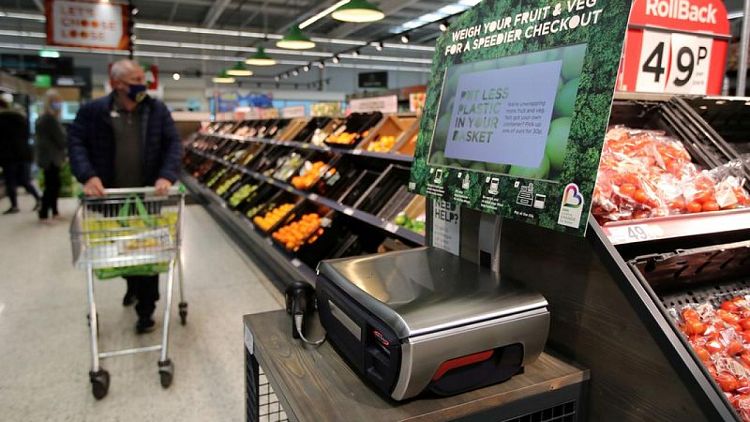By James Davey
LONDON - British shoppers turned to cheaper own label food products and discounters as they battled grocery price inflation of 5.2% over the four weeks to March 20, the highest level since April 2012, according to industry data published on Tuesday.
Market researcher Kantar said it was evident a switch had started from the COVID-19 pandemic being the dominant factor driving shopping behaviour towards the growing impact of inflation, as the cost of living becomes the bigger issue on consumers' minds.
Overall UK inflation hit a 30-year high of 6.2% in February and the government's budget watchdog last week forecast it will go close to 9% in late 2022, contributing to the biggest fall in living standards since at least the 1950s.
Kantar said take home grocery sales fell 6.3% over the 12 weeks to March 20, as consumers are now more confident eating out of the home again. Sales were up 0.7% versus two years ago.
The proportion of spending on own label products, which are usually cheaper than branded alternatives, rose to 50.6% versus 49.9% this time last year.
Kantar said German-owned discounters Aldi and Lidl were the best performing grocers over the 12 weeks, both increasing their sales by 3.6% year-on-year. Aldi hit a record high market share of 8.6%, while Lidl matched its record high of 6.4%.
Market leader Tesco was the only other group to perform ahead of the market, with its share moving up to 27.4%.
Rivals, Sainsbury's, Asda and Morrisons all lost share.
Kantar also noted that the data marked the first annual decline in shopping trips for 12 months, with households making 15.4 visits to the supermarket on average in March, compared with 15.6 in March 2021.
"Higher fuel prices could be playing a role here too as people try to save petrol by visiting the supermarkets less often," said Fraser McKevitt, head of retail and consumer insight at Kantar.
The researcher said prices were rising fastest in markets such as savoury snacks, dog and cat food, while falling in fresh bacon.
Market share and sales growth (%)
Market share Market share % change in
12 wks to 12 wks to sales
March 20 March 21 (yr-on-yr
2022 2021
Tesco 27.4 27.1 -5.2
Sainsbury's 15.1 15.3 -7.5
Asda 14.5 15.1 -9.9
Morrisons 9.5 10.1 -11.5
Aldi 8.6 7.8 3.6
Lidl 6.4 5.8 3.6
Co-operative 6.0 6.2 -8.5
Waitrose 4.8 4.9 -8.5
Iceland 2.2 2.3 -9.6
Ocado 1.8 1.9 -6.7
Source: Kantar
